Nobel Peace Prize Winner Ends Hunger Strike After Hospital Visit
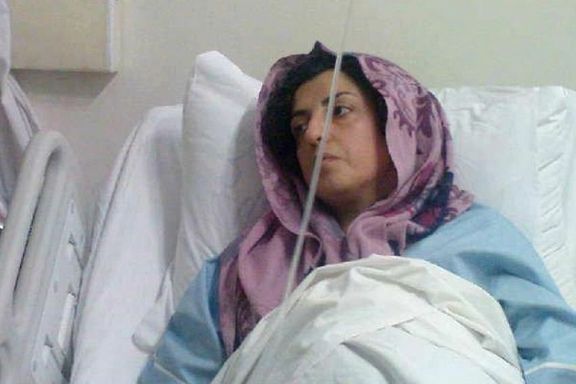
Iranian prison authorities have finally bowed to pressure to send Narges Mohammadi to hospital without her mandatory hijab after several days of hunger strike.

Iranian prison authorities have finally bowed to pressure to send Narges Mohammadi to hospital without her mandatory hijab after several days of hunger strike.
The Nobel Peace Prize laureate had required medical attention outside Evin Prison but was barred from heart and lung treatment for refusing to wear the Islamic headscarf.
Her family announced the hunger strike on Monday as the rights activist stood firm in her objection to the compulsory hijab, a symbol at the heart of nationwide protests since last year. By Thursday, after mounting international pressure, prison officials eventually transported her to the hospital.
In a statement on her Instagram account, the 51-year-old announced that her resistance has finally paid off, able to go to the hospital "without a headscarf and in a business suit".
Mohammadi, declared as the Nobel Peace Prize winner in 2023, is one of the most prominent advocates for women's rights globally. She has repeatedly voiced her opposition to mandatory hijab and has spent her life in and out of Iranian jails fighting for justice.
The Instagram account of Golrokh Iraee, a political prisoner in Evin, also mentioned that Mohammadi and her fellow protesters, who had initiated a hunger strike in protest against the policy of "either death or mandatory hijab" and the prevention of Mohammadi's hospitalization, have broken their strike after medical attention was provided to Mohammadi.
Iraee emphasized in her post, "Nasrin's refusal to wear the mandatory headscarf is a step towards overthrowing the hijab. The compulsion has led to the humiliation, suppression, and torture of Iranian women for more than four decades and has resulted in the deaths of many, including Mahsa Amini and Armita Geravand.”
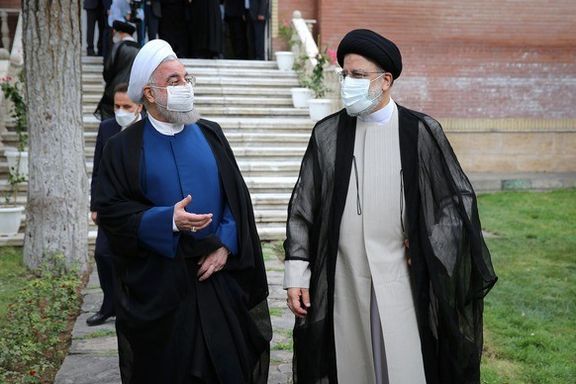
Hassan Rouhani, the ex-president of Iran, addressed the ongoing conflict in Gaza, warning that the regime's flaming of unrest is putting Iran at risk.
He emphasized the potential consequences of its being overly involved, directly or indirectly through its proxies, warning that "a mistake, a wrong decision, or an imprecise action could drag the flames of war towards us."
Rouhani highlighted a development within Iran, noting a division among the people regarding the Gaza issue, a situation he deemed “unprecedented.”
Iran-backed Hamas invaded Israel on October 7, leading to the worst conflict in the Gaza Strip since Hamas took control in 2007. Iran's proxies across the region in Syria, Lebanon, Iraq and Yemen have all since been involved as the conflict escalates, in spite of Tehran's ongoing denials of involvement.
It has created a huge divide among the Iranian population with many voicing support for Israel as it battles Iran's biggest Palestinian proxy.
Adding to the concerns, former Foreign Minister Javad Zarif warned of the possibility of war. During a gathering discussing the Palestine issue from the perspective of international law on Wednesday, Zarif expressed apprehension about the potential consequences of being drawn into the conflict between Hamas and Israel, asserting that “it would not affect the officials in power but would impact the Iranian people.”
The United States has taken a strong stance in support of its ally Israel. Following the surprise attack by Hamas on October 7 which was the most deadly single day for Jews since the Holocaust, the US has mobilized warships and troops, vowing to stand by Israel.
The allegiance has since resulted in US facilities in Syria and Iraq coming under fire from Iran's proxies.
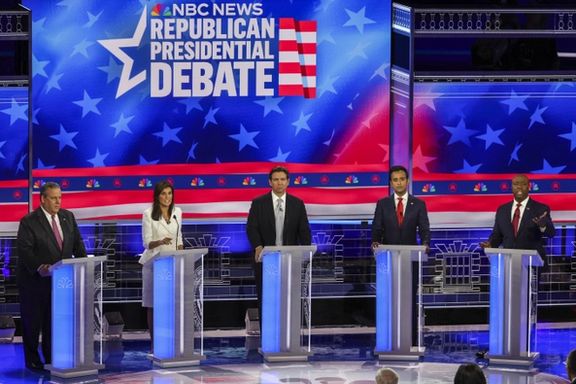
US Republican presidential candidates held another primary debate in Miami Wednesday, a session dominated by how to deal with Iran and its proxies.
Republican presidential candidates former UN Ambassador Nikki Haley and Florida Gov. Ron DeSantis led the third GOP debate with decisive plans against the Islamic Republic as all the runners were unanimous that Tehran is the head of the snake that is wreaking havoc across the Middle East and the world. Former New Jersey Gov. Chris Christie, Senator Tim Scott (R-SC) and entrepreneur-turned-politician Vivek Ramaswamy were also contenders.
Israel, the closest US ally in the Middle East, was invaded by Iran-backed Hamas militias on October 7, an operation cheered and cherished by Tehran that saw 1,400 mostly civilians slaughtered and over 240 taken to Gaza as hostages. Israel has been pounding the enclave to uproot the Islamist group, which has made the war exceedingly bloody hiding deep among the civilian population and underneath the coastal sliver’s non-military facilities. GOP hopefuls reiterated Israel’s right to defend itself against Hamas, but went further and vowed to address the issue at its core, the regime in Tehran.
Four of the five GOP presidential candidates in the debate voiced strong support for Israel in its war against Hamas, whose self-proclaimed goal is to wipe Israel off the map, with only Ramaswamy warning against the US being drawn into another war in the Middle East.
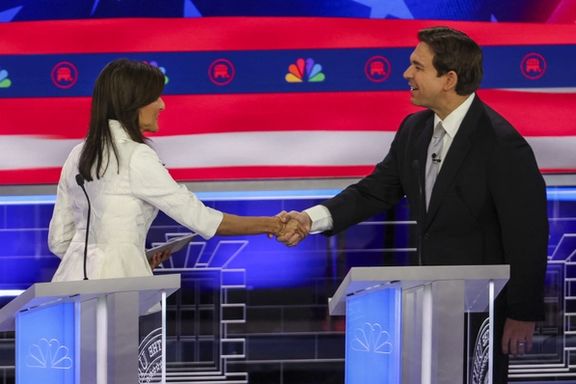
In response to a question about what he would tell Israeli Prime Minister Benjamin Netanyahu if he were president, DeSantis said, "I will tell Bibi to finish the job once and for all and destroy the butchers from Hamas." Haley said she too would not tell him anything other than to provide support to finish Hamas. “Finish them. Finish them... The last thing we need to do is tell Israel what to do," she said.
"There would be no Hamas without Iran; there would be no Hezbollah [Iran's Lebanese proxy] without Iran; no Houthis [in Yemen] without Iran; and there would not be Iranian militias in Syria and Iraq trying to hit US military men and women,” Haley said, noting that Iran is itself funded by the oil it sells to China and the drones and missiles it sells to Russia. “There is an unholy alliance.”
Answering a question on the US using military force against Iran, Haley said President Joe Biden "tiptoes" around Iran, stating that Iran will stop attacking US forces in the region only if the US uses force to prevent it. It is “unthinkable” that American forces are being hit by Iran-backed militias under Biden’s watch.
"This is Iran giving the green light... we need to go and take out their infrastructure” that enables the strikes. “Iran responds to strength, you punch them one and you punch them hard, and they will back off.”
Of around 40 attacks on US facilities since the war broke out in Gaza, the US has retaliated only twice. DeSantis also said Biden is not doing enough to protect US soldiers in the Middle East from Iranian attacks, stating that “You harm a hair on the head of an American service member and you are going to have hell to pay.”
Former New Jersey Gov. Chris Christie said to make sure Hamas, or any other Iran-backed militia group, would not threaten Israel and US forces in the region, Washington must work with its Arab allies in the region to further isolate Iran “so their only friends are the evil forces: China, Russia, and North Korea.”
Sen. Scott highlighted Israel’s “right and the responsibility” to wipe Hamas off the map, calling on Biden to be more aggressive in attacking Iranian assets. "We need to attack Iran, not just warehouses in Syria," Scott said, an apparent reference to the US airstrike on a facility controlled by the Iranian Revolutionary Guards Corps (IRGC) and affiliated groups in eastern Syria hours before the debate started.
"We need to cut the head of the snake, and the head of the snake is Iran and not simply its proxies,” he said. “Diplomacy only is a weak strategy... You cannot negotiate with evil. You have to destroy it.”
The Republican runners competed with one another to debunk the “so-called Islamophobia” and spoke out aggressively about antisemitism, vowing to deport foreign students who support Hamas and cut any federal funding to universities that are tolerating antisemitism as it surges across the US. Jewish schools and synagogues have been forced to close as hate crimes against the Jewish community are worse than has been seen in recent history.
“Let me just say to every single university president in America, federal funding is a privilege not a right,” Scott said. “To all the students on visas who are encouraging Jewish genocide, I would deport you."
In a rare show of unity, the Republican presidential candidates all drew a hard line on Iran and issued stark warnings to the Islamic Republic, who has been warning of the conflict spiraling into a larger regional war since Israel launched its retaliatory offensive on Hamas. The GOP runners’ promise is the latest in a wave of calls for a military action against Iran, which is not shy about its support for anti-Israel and anti-US sentiments and actions across the Middle East and is counting the days until the destruction of Israel as prophesied by Supreme Leader Ali Khamenei.
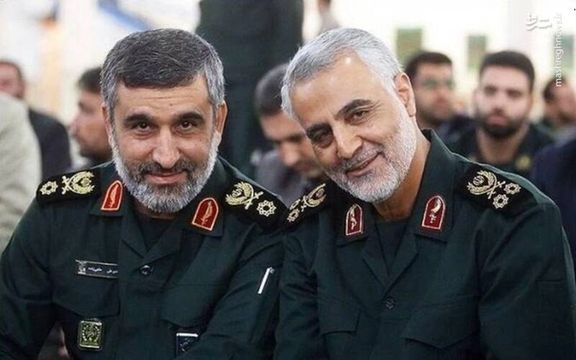
Amir Ali Hajizadeh, the IRGC aerospace commander, said that Iran decided not to wage a war to avenge the US killing of Qassem Soleimani because “it was not logical.”
A short video released by Etemadonline, an Iranian daily, shows the IRGC commander saying that a war with the US at that point could have inflicted heavy casualties on Iran, killing 10-15,000 civilians and soldiers. It would also see Iran regress for 10 to 20 years, he added.
According to Hajizadeh, the Iranian officials noted at that time that having a full-scale confrontation with the US would not be conducive to “desired results.”
This is while Tehran previously claimed that Washington called for immediate deescalation after its airstrike which claimed the life of Soleimani.
Soleimani, the Iranian regime’s top military and intelligence operator in the Middle East, was killed in a US drone strike in January 2020 in Iraq’s capital, Baghdad. He oversaw the regime’s proxies in the region.
Washington justified the action by saying that Soleimani was actively planning attacks against American diplomats and military personnel in Iraq and the broader region.
Iranian leaders have often vowed to avenge Soleimani including threatening the assassination of former US President Donald Trump, who gave the green light for the commander's death.
Speaking on the occasion of the third anniversary of Soleimani’s killing, Iranian Foreign Minister Hossein Amir-Abdollahian also said that nearly 60 US officials were blacklisted by Tehran for their involvement in the assassination of Tehran’s top commander.
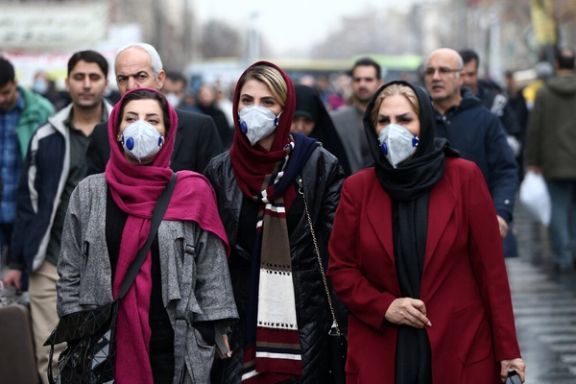
Iran's leading economic daily, Donyaye Eqtesad, has revealed a huge gender gap in the Iranian labor market with unemployment among women double that of men.
The report not only points out the glaring gender disparity but also highlights the absence of a clear policy to harness the economic potential of women in Iran.
Despite women's significant contributions to the nation's economy, the report suggests that their abilities are not fully utilized. It emphasizes that reducing women's unemployment rates and increasing their workforce participation could have a positive impact on reducing poverty at the household level.
According to the latest findings from the Iran Statistical Center regarding labor market developments this year, women's participation rate has reached 14.6%. However, it is concerning that out of over 32 million women of working age, more than 27.5 million remain inactive and are not part of the workforce, limiting their economic opportunities.
The report also reveals that women's labor force participation in Iran lags behind that of some neighboring countries, such as Saudi Arabia, where it has doubled from 15% in 1990 to 30% in 2020 over a 30-year period.
The findings are consistent with the United Nations Human Development Report for 2020 and 2021, which showed Iran ranked at 115 out of 191 countries in terms of gender inequality.
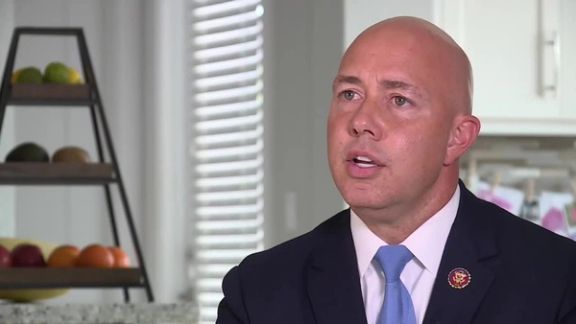
Brian Mast, a Republican member of the US Congress, called for transparency regarding the case of Robert Malley, the suspended US special envoy for Iran.
In an interview with One America News Network, Mast criticized the US government for not shedding light on the events that led to Malley’s suspension, noting that he was “quietly” removed from his position earlier this year.
Iran International broke the news in late June that Malley’s security clearance had been revoked and he was no longer acting as US envoy, but the State Department has remained tight-lipped about the details of the case. Critics of the administration and US lawmakers have demanded answers, but so far the administration has refused to provide details.
Mast stressed that the US government did not notify the Congress about revoking Malley’s security clearance, adding that the affair was discovered “by accident.”
He called Malley “an Iranian sympathizer working to be soft on Iran” and pointed that Malley championed Washington’s adoption of “soft policies” towards a state which urges the destruction of the United States and Israel.
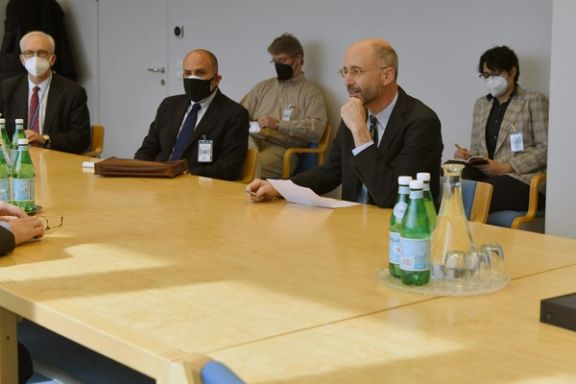
The congressman also referred to the case of Ariane Tabatabai, a former associate of Malley and the current Chief of Staff for the Assistant Secretary of Defense, who has had close ties with the Iranian regime.
Tabatabai was alleged to be part of a network that tried “to gain influence to top US diplomats and convince them to be soft on Iran,” Mast went on to say.
Iran International’s exposé, Inside Tehran’s Soft War: How Iran Gained Influence in US Policy Centers, and its twin report by Semafor, Inside Iran’s Influence Operation, prove the existence of the “Iran Experts Network”, whereby members acted as agent provocateurs of the regime.
Mast pointed out that according to the information revealed, Tabatabai “was directly reporting to the Iranian foreign ministry.”
He added that in order to obtain a security clearance, one is needed to disclose all their ties with foreign countries.
There is still no information whether Tabatabai has informed the authorities about her interactions with the Iranian government, Mast stated.
He further called Iran’s influence campaign “a serious problem” and urged the Biden administration to address it with transparency.
Mast, a member of the House Foreign Affairs Committee, also accused Tehran of having a hand in Hamas October 7 deadly attack on Israel, which claimed the lives of 1,400 mostly civilians and left thousands injured in the single most deadly day for Jews since the Holocaust.
Mast’s remarks came four weeks after top US Republicans at the Senate and the House opened dual probes into Malley's links to the secret Iranian influence network.
At the same time, House Committee on Oversight and Accountability Chairman James Comer (R-KY) and Subcommittee on National Security, the Border, and Foreign Affairs Chairman Glenn Grothman (R-WI) also raised concerns about the Administration’s use of officials with sympathetic ties to the Iranian regime to negotiate with Tehran.
Also on October 24, America First Legal, a group of conservative lawyers, announced that it had launched a probe into the activities of a pro-Iran influence network in the United States which can pose a threat to the American national security.
"It is of paramount importance that the truth about the role that Iranian assets may have played, and may continue to be playing, in formulating US policy be brought to light," said Reed Rubinstein, the group’s senior counselor.